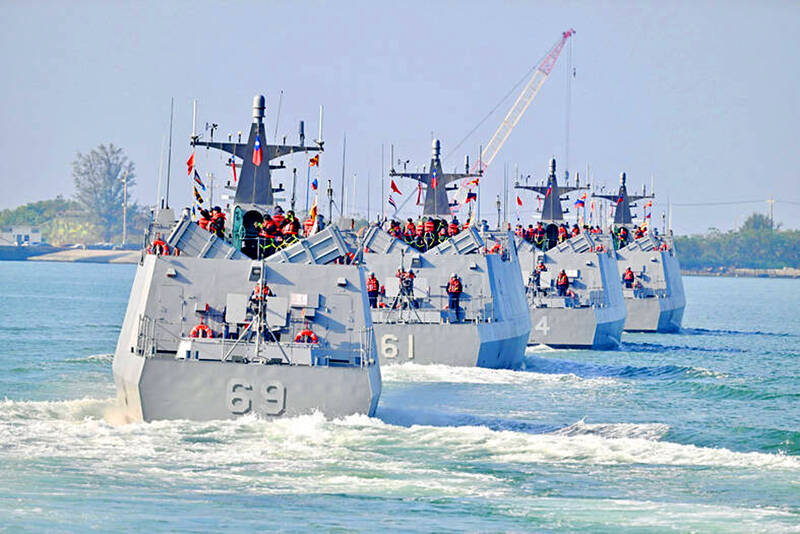Taiwan must take steps to avoid being blamed for escalation if it responds with force to Chinese naval incursions into its territorial waters, a former US Navy intelligence head said.
The best way to handle violent tactical encounters is to shape the information space early — exposing Chinese actions and framing them as aggressors, provocateurs and a threat not just to Taiwan, but to the entire region, former US Office of Naval Intelligence commander Mike Studeman said on Friday.
Studeman — who reportedly visited Taiwan in 2020 while serving as director of the J2 intelligence division at the US Indo-Pacific Command, making him one of the highest-ranking US military officers to visit Taiwan over the past few years — was asked by the Central News Agency about a tabletop war game held in Taipei last week that simulated a 2030 scenario in which Chinese navy ships intrude into Taiwan’s territorial waters amid escalating tensions.

Photo: Tu Chien-jung, Taipei Times
In the war game, Taiwan chose not to immediately strike Chinese navy vessels that entered its territorial waters.
Instead, it deployed coast guard and navy ships to shadow the intruders, and positioned submarines in ambush zones northeast and southwest of Taiwan proper, and said this approach was guided by its principle of not firing the first shot.
“The moral high ground and legitimacy of any tactical actions will be contested in the information domain,” said Studeman, who is a national security fellow at MITRE, a nonprofit research group.
At the Taipei war game on Tuesday and Wednesday last week, attended by former US and Japanese defense officials, the US officials said Taiwan might eventually need to open fire to expel Chinese intruders — but emphasized the importance of giving advance warning.
China has a broader propaganda reach, ready to portray itself as the victim of any Taiwan-initiated aggression, Studeman said.
“Worst case, Taiwan’s actions could justify harsh countermeasures from Beijing across all domains to punish Taiwan,” he said.
“I don’t think we can easily predict what level of support political leaders [in Washington and Tokyo] might be willing to provide to Taipei, especially if the tactical interaction becomes a ‘he said, she said’” situation, Studeman added.
“Taiwan must repeatedly warn that China is pressing up to red lines that will require a strong Taiwan response,” he said.
“Failure to demonstrate the appropriate use of strength and resolve at the right time in the right way will only invite deeper and unacceptable encroachments,” Studeman said.
Such developments could “ultimately compromise the defense system required to protect Taiwan’s existence as a democracy,” he added.

Nipah virus infection is to be officially listed as a category 5 notifiable infectious disease in Taiwan in March, while clinical treatment guidelines are being formulated, the Centers for Disease Control (CDC) said yesterday. With Nipah infections being reported in other countries and considering its relatively high fatality rate, the centers on Jan. 16 announced that it would be listed as a notifiable infectious disease to bolster the nation’s systematic early warning system and increase public awareness, the CDC said. Bangladesh reported four fatal cases last year in separate districts, with three linked to raw date palm sap consumption, CDC Epidemic Intelligence

The manufacture of the remaining 28 M1A2T Abrams tanks Taiwan purchased from the US has recently been completed, and they are expected to be delivered within the next one to two months, a source said yesterday. The Ministry of National Defense is arranging cargo ships to transport the tanks to Taiwan as soon as possible, said the source, who is familiar with the matter. The estimated arrival time ranges from late this month to early next month, the source said. The 28 Abrams tanks make up the third and final batch of a total of 108 tanks, valued at about NT$40.5 billion

Two Taiwanese prosecutors were questioned by Chinese security personnel at their hotel during a trip to China’s Henan Province this month, the Mainland Affairs Council (MAC) said yesterday. The officers had personal information on the prosecutors, including “when they were assigned to their posts, their work locations and job titles,” MAC Deputy Minister and spokesman Liang Wen-chieh (梁文傑) said. On top of asking about their agencies and positions, the officers also questioned the prosecutors about the Cross-Strait Joint Crime-Fighting and Judicial Mutual Assistance Agreement, a pact that serves as the framework for Taiwan-China cooperation on combating crime and providing judicial assistance, Liang

Reports of Taiwanese going missing, being detained or interrogated, or having their personal liberties restricted in China increased about fourfold annually last year, the Mainland Affairs Council (MAC) said yesterday. Last year, 221 Taiwanese who traveled to China were reported missing, were detained and interrogated, or otherwise had their personal freedom restricted, up from 55 the previous year, the council said. Reopening group tours to China would be risky, as it would leave travelers with no way to seek help through official channels after Beijing shut down dialogue between the associations tasked with handling cross-strait tourism, the MAC said. Taipei’s Taiwan Strait Tourism